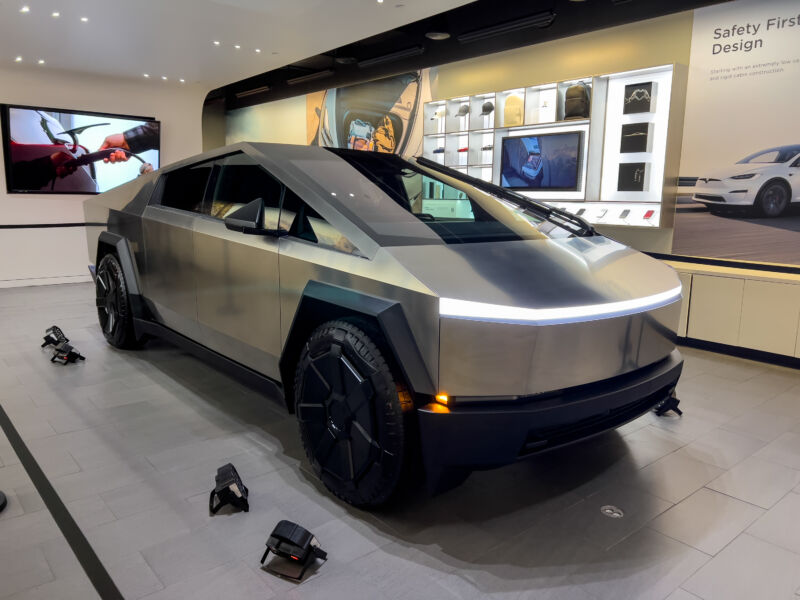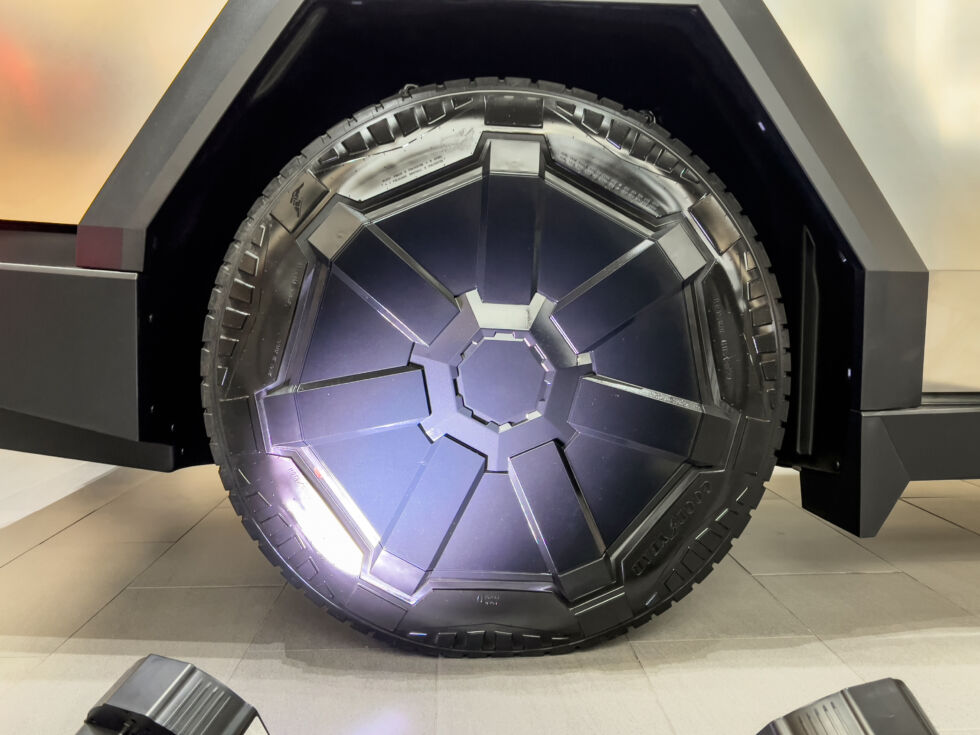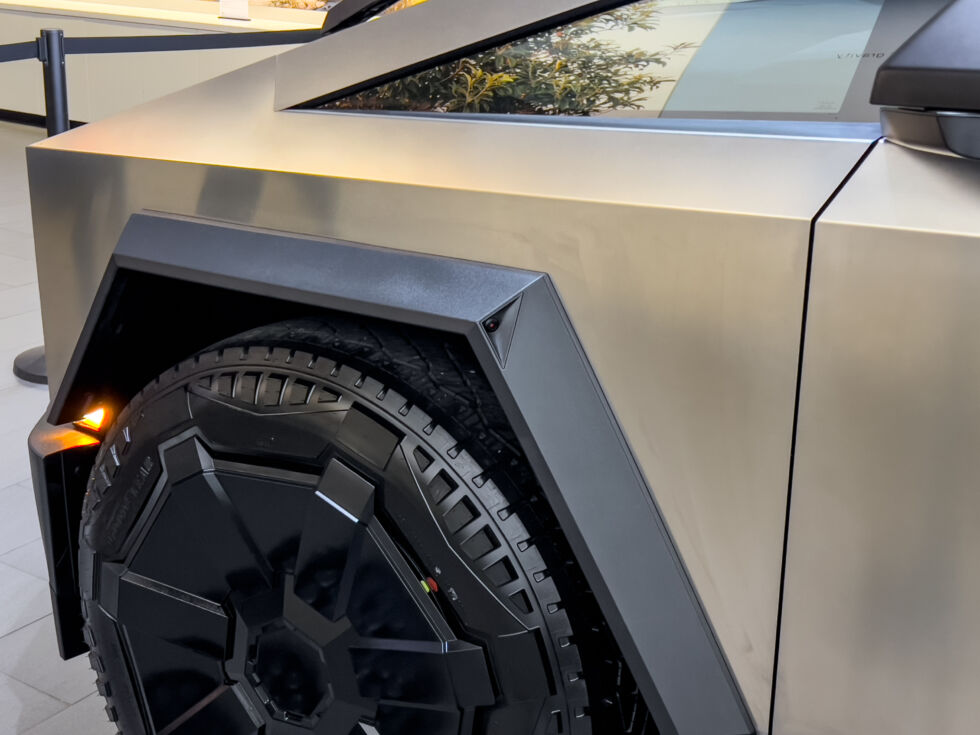
Jonathan Gitlin
On Thursday afternoon, Tesla delivered the first 10 production Cybertrucks to customers at an event livestreamed on X, Tesla CEO Elon Musk’s social media network. A demo video featured shots of the Cybertruck negotiating barren wildernesses, including one that was meant to look admire Mars. Musk, who has mostly made headlines in recent weeks for endorsing virulent antisemtitic theories on his social media platform, took to the stage almost half an hour late, initially delivering his presentation from the back of a truck with his face hidden in shadow.
Musk claimed the Cybertruck is better than any other truck but also more of a sports car than any other sports car, made of a “special Tesla designed steel alloy” that he claimed will never rust and which cannot be stamped but which can also be produced in volume.
Mindful of the window-breaking debacle during the truck’s debut in 2019, Tesla designer Franz von Holzhausen came on stage to throw baseballs at its windows. Unlike last time (when presenters used metal balls), the allegedly bulletproof glass did not shatter. Musk made a point of the fact that in a crash with another vehicle, the Cybertruck—which weighs 6,603–6,843 lbs (2,995–3,104 kg)—will destroy the other vehicle.
The Tesla CEO also reiterated that the truck’s body panels are bulletproof, citing “late civilization vibes,” although the wheels and tires are very much not bulletproof but quite necessary if the truck is required to advance from place to place.

Jonathan Gitlin
“If you can fit any cargo in the trunk or the bed, you can basically advance it around,” Musk said, citing a payload capacity of a ton, the ability to tow 11,000 lbs, and the fact that 8 x 4 sheets of plywood will fit in the bed, although the bed actually measures 6 feet by 4 feet.
Musk’s presentation made it sound admire Tesla has developed a lot of new technology for the Cybertruck, which will come as a surprise to all those OEMs that have already delivered vehicles with four-corner air suspension, 48 V ancillary systems, and torque-vectoring drive units. But other currently hot automotive features admire active antiroll bars and rear wheel steering were not mentioned.
We did find out some more of the trucks’s specifications, admire its 0.34 drag coefficient (worse than a Rivian R1T, better than a Ford F-150, albeit with a larger frontal area than either. And it has a 0–60 mph time of 2.6 seconds, possibly while towing a sports car, although it’s unclear whether that was conducted with knobby off-road tires. Musk then handed over the first 10 production models to specially vetted customers.

Jonathan Gitlin
While the presentation was light on details, Tesla published a webpage for ordering the truck that fills in some of the blanks. Interestingly, the price to put down a deposit has increased, from $100 to $250. The cheapest configuration will be a rear-wheel drive Cybertruck that won’t be available until 2025, at an estimated $60,990. Tesla predicts this variant will have a range of 250 miles (402 km) and a 0–60 time of 6.5 seconds.
The other two variants both list availability in 2024. The all-wheel drive variant has a claimed range of 340 miles (547 km) and a 3.9-second 0–60 time (or a 4.1 second time, depending on which page you look at), with a 112 mph (180 km/h) top speed. Tesla says the AWD Cybertruck has 600 hp (447 kW) and 7,435 lb-ft (10,080 Nm) of torque, suggesting Tesla is reporting torque the same way hyperbolic way that GMC chose to with the “11,500 lb-ft” Hummer EV. This truck has an estimated price of $79,990, which importantly means its starting price is less than the price cap for the IRS’s clean vehicle tax credit.
The final variant is the Cyberbeast, which Tesla estimates will cost $99,990. Range is a little less, at 320 miles (515 km), but it has 845 hp (630 kW), a claimed 10,296 lb-ft (13,959 Nm), and a top speed of 130 mph (210 km/h), as well as that aforementioned 2.6-second time to 60 mph.
-
Notably, the A-pillar looks much tidier than we’ve seen on Cybertrucks in the wild.
Jonathan Gitlin -
The truck features a single massive windscreen wiper.
Jonathan Gitlin -
The truck from the rear.
Jonathan Gitlin -
Anyone reminded of Battlestar Galactica?
Jonathan Gitlin
Although deliveries are still months away, some Tesla stores, including one in the Maryland suburbs outside of Washington, DC, now have showroom models. I braved the Beltway earlier today to go check it out and can report that although roped off behind stanchions, the fit and finish appeared far better than the preproduction prototypes that have been seen driving in the wild.

